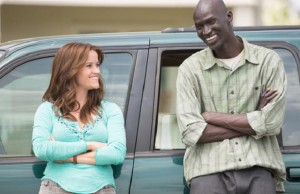THE GOOD LIE: 2 ½ STARS. “more successful at raising a smiles than awareness.”
 “The Good Lie,” a new drama starring Reese Witherspoon in full-on Sandra “The Blind Side” Bullock mode, shines a light on an important story but does so in a familiar way.
“The Good Lie,” a new drama starring Reese Witherspoon in full-on Sandra “The Blind Side” Bullock mode, shines a light on an important story but does so in a familiar way.
The story begins during Sudan’s civil war, a brutal conflict that forced thousands of people—most of them little more than children—to walk thousands of miles to flee the violence. Almost all ended up in refugee camps, some for years. “The Good Lie” is aboutleft four “lost” boys and girls who were given a chance at a life in America. Mamere (Arnold Oceng), Jeremiah (Ger Duany), Paul (Emmanuel Jal) and Mamere’s sister Abital (Kuoth Wiel) are the recipients of humanitarian aid and relocated to the US, but due to a bureaucratic rule Abital is separated from the men.
In charge of finding work for the new comers is Carrie (Witherspoon), a case worker who, at first, is looking to get their file off her desk but soon becomes involved in their lives and their need to be reunited as a family.
Academy Award-nominated “Monsieur Lazhar” director Philippe Falardeau is straightforward in his telling of this story, mixing the human interest story with large dollops of humor and humanity, but echoes of other movies, like “The Blind Side” and “Dangerous Minds” reverberate throughout.
Falardeau focuses on the story of the refugees but the inclusion of Carrie, Witherspoon’s well-meaning case worker, shifts attention away from the crux of the story, as if the Sudanese somehow has more gravitas if told through a North American lens.
It is, however, a well-intentioned, feel good movie, nicely performed by Witherspoon and the Sudanese cast—Duany and Oceng are stand-outs—that is more successful at raising a smiles than awareness.
